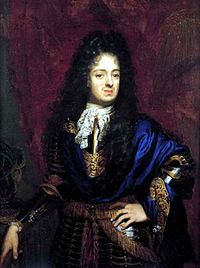Ferdinando III de' Medici
| Ferdinando de' Medici | |||||
|---|---|---|---|---|---|
 |
|||||
| Grand Prince of Tuscany | |||||
| Tenure | 23 May 1670 – 31 October 1713 | ||||
| Born |
9 August 1663 Pitti Palace, Florence, Tuscany |
||||
| Died | 31 October 1713 (aged 50) Pitti Palace, Florence, Tuscany |
||||
| Burial | Basilica of San Lorenzo, Florence | ||||
| Spouse | Violante Beatrice of Bavaria | ||||
|
|||||
| Royal | House of Medici | ||||
| Father | Cosimo III, Grand Duke of Tuscany | ||||
| Mother | Marguerite Louise d'Orléans | ||||
| Religion | Catholicism | ||||
| Full name | |
|---|---|
| Ferdinando de' Medici |
Ferdinando de' Medici (9 August 1663 – 31 October 1713) was the eldest son of Cosimo III de' Medici, Grand Duke of Tuscany, and Marguerite Louise d'Orléans. Ferdinando was heir to the Grand Duchy of Tuscany, with the title Grand Prince, from his father's accession in 1670 until his death in 1713. He is remembered today primarily as a patron of music. An excellent musician himself (sometimes called "the Orpheus of princes"), he attracted top musicians to Florence and thus made it an important musical center. Through his patronage of Bartolomeo Cristofori, Ferdinando made possible the invention of the piano.
Ferdinando was born in the Palazzo Pitti to Cosimo III de' Medici and his wife Marguerite Louise d'Orléans, a granddaughter of Maria de' Medici. When Ferdinando's parents separated in 1675, his mother (who disdained her husband only slightly more than Florence did) returned to Paris, where she was supposed to be confined to a monastery in Montmartre. Ferdinando became a rebellious youth, who disagreed intensely with his father on every subject. He was placed under the care of his grandmother, Vittoria della Rovere.
Ferdinando had a great affinity with his vivacious mother. He was handsome, a fine horseman, and a talented musician. He sang melodiously and played the harpsichord. He was a master in counterpoint, which he studied under Gianmaria Paliardi of Genoa, and in various bowed instruments, which he studied under Piero Salvetti. He was known for his ability to play a piece of music at sight and then repeat it faultlessly without looking at the music.
Aside from music, Ferdinando's other principal delight was in intimate liaisons and affairs, often with men. These included Petrillo, a musician famous for his beauty, and Cecchino, a Venetian castrato. Ferdinando's uncle Francesco Maria de' Medici, only three years older, was a strong influence on his life.
...
Wikipedia
